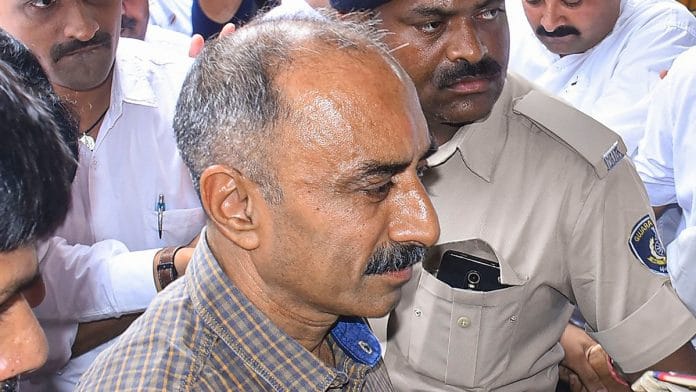New Delhi: Former IPS officer Sanjiv Bhatt had “beaten” and “threatened” all eyewitnesses and it has been “proved and clarified”, judge D.M. Vyas of Jamnagar Sessions Court said in the verdict while convicting the former IPS officer in a 1990 custodial death case Thursday.
Bhatt, a 1988-batch IPS officer of the Gujarat cadre, has been sentenced to life imprisonment.
The court found Bhatt guilty of murdering Prabhudas Madhavji Vaishnani who was taken into custody with 133 others during communal riots in 1990 in Jamnagar.
‘Intention to kill’
ThePrint has exclusively accessed the 432-page verdict written in Gujarati of the Sessions Court that convicted Bhatt primarily on the basis of eyewitnesses’ accounts. The eyewitnesses had testified that the former IPS officer’s intention was indeed to “kill” the ones taken into custody. They also said that the deceased “was beaten badly” by Bhatt.
“The eyewitness and injured person, Rameshbhai Vaishnani’s verbal statement states that accused’s (Sanjiv Bhatt) motive was clear and that was to kill the deceased (Prabhudas Madhavji Vaishnani) and that the other accused was there to help him,” the judge said in the verdict.
“In this case, all the eyewitnesses (others who were taken into custody) were threatened and harmed. The complainant was also beaten badly and has been proven by medical reports too,” the verdict stated.
‘No recovery of arms from detainees’
One of the main arguments of Bhatt was that arms were recovered from those taken into custody. The court has also noted that Bhatt had argued that the police “had recovered arms from deceased”.
However, while dismissing this contention, judge Vyas stated “during investigation there was no recovery of any kind of arms, and people where beaten up which was proved and clarified.”
‘Extreme internal injury’
The trial court has stated the deceased had died due to “physical pain, inner pain which led to kidney failure…as per medical opinion”.
The court has accepted though there was no external injury mark on the deceased’s body, but the fact that the death was due to an “extreme internal injury” was the reason behind Bhatt’s conviction under IPC Section 302 (punishment for murder).
Also read: How a 22-year-old drug bust case has returned to haunt Modi critic & former IPS officer
Vehicle logbook stated Bhatt was at crime spot
The verdict stated the vehicle logbook and the official weekly diary confirmed the presence of the former officer at the site of the crime.
“The official weekly diary is recorded by the police. According to the information of the official vehicle’s logbook officer, the driver was registered. The information in the Weekly Diary, the documents related to the government vehicle’s logbook facts, affidavits related to the police have been prepared by the police officers themselves, and hence this fact seems fair and reasonable to take into consideration,” stated the court.
The judge further noted that on the day of taking the ‘rioters’ into custody, “both police officer and workers were on their duty”, and that “logbook is taken under consideration which display truth.”
The court also noted that since Bhatt was an ACP-rank officer, no one could risk a tussle with him fearing repercussions.
“The accused was an ACP class officer and in other words, during the time of the crime, accused was a major rank officer,” the court said. There “could not be any fight between the accused and the deceased,” it said, adding that such a reasoning was “not acceptable too.”
Bhatt to challenge his conviction
Bhatt’s counsel P.M. Buch told ThePrint he would challenge the verdict in the Gujarat High Court in the coming week on the prime grounds that the trial court has ignored “Section 197 of CrPC” and did not examine “investigating officers under whose custody the deceased was” taken in.
Section 197 of the Criminal Procedure Code demands approval from the state government before prosecuting a public servant or police officer.
Buch claimed that “sanction was sought in 1992 and it was rejected after thorough investigation by the Gujarat government in 1994”.
Drawing parallel with the Sohrabuddin encounter case, Buch said “former cop D.G. Vanzara and P.C. Pandey were discharged on this ground by the courts as there was no sanction,” but that in this case “sanction was sought but then rejected”.
Another ground for appeal would be the non-examination of investigating officers under whose custody the deceased was taken in. “In this matter, none of the investigating officers who took the deceased and others in custody were examined. These witnesses were cited but not examined by the prosecution,” Buch said.
A third ground would also be the fact that the injury of the deceased was not due to custodial torture. “Twelve days after the deceased was released from custody on bail, he was admitted to Rajkot’s Virani hospital. How can someone die of custodial torture if he is fine for 12 days upon release?” asked Buch.
Buch also said the postmortem report of the deceased said that “the cause of death cannot be divulged”.
“Opinion of nephrologist was sought as the death was due to kidney failure. A Padma Shri awardee doctor has testified that no injury on the body was reported and that there was no rupture of kidney. But his opinion was discarded by the court,” said Buch.






